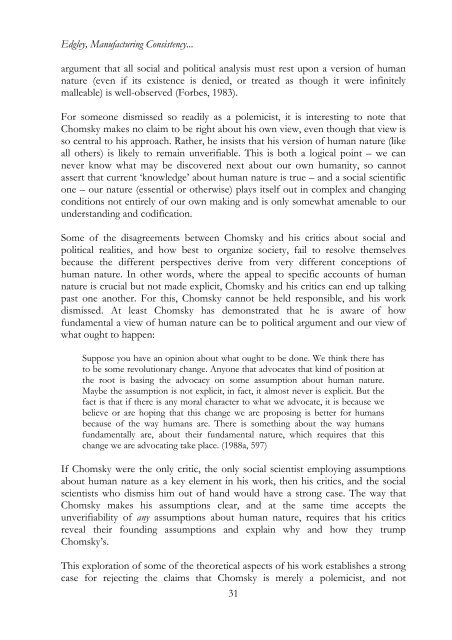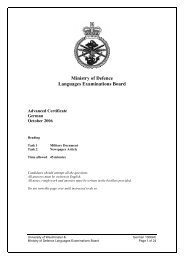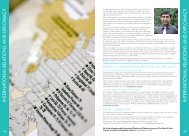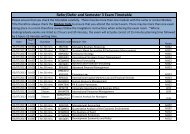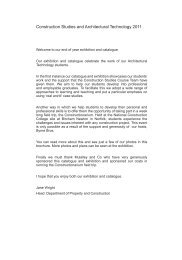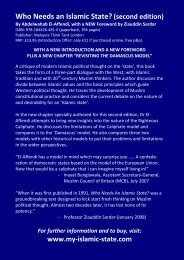Social Science, Rhetoric and Chomsky's Critique - Alison Edgley
Social Science, Rhetoric and Chomsky's Critique - Alison Edgley
Social Science, Rhetoric and Chomsky's Critique - Alison Edgley
You also want an ePaper? Increase the reach of your titles
YUMPU automatically turns print PDFs into web optimized ePapers that Google loves.
<strong>Edgley</strong>, Manufacturing Consistency...argument that all social <strong>and</strong> political analysis must rest upon a version of humannature (even if its existence is denied, or treated as though it were infinitelymalleable) is well-observed (Forbes, 1983).For someone dismissed so readily as a polemicist, it is interesting to note thatChomsky makes no claim to be right about his own view, even though that view isso central to his approach. Rather, he insists that his version of human nature (likeall others) is likely to remain unverifiable. This is both a logical point – we cannever know what may be discovered next about our own humanity, so cannotassert that current ‘knowledge’ about human nature is true – <strong>and</strong> a social scientificone – our nature (essential or otherwise) plays itself out in complex <strong>and</strong> changingconditions not entirely of our own making <strong>and</strong> is only somewhat amenable to ourunderst<strong>and</strong>ing <strong>and</strong> codification.Some of the disagreements between Chomsky <strong>and</strong> his critics about social <strong>and</strong>political realities, <strong>and</strong> how best to organize society, fail to resolve themselvesbecause the different perspectives derive from very different conceptions ofhuman nature. In other words, where the appeal to specific accounts of humannature is crucial but not made explicit, Chomsky <strong>and</strong> his critics can end up talkingpast one another. For this, Chomsky cannot be held responsible, <strong>and</strong> his workdismissed. At least Chomsky has demonstrated that he is aware of howfundamental a view of human nature can be to political argument <strong>and</strong> our view ofwhat ought to happen:Suppose you have an opinion about what ought to be done. We think there hasto be some revolutionary change. Anyone that advocates that kind of position atthe root is basing the advocacy on some assumption about human nature.Maybe the assumption is not explicit, in fact, it almost never is explicit. But thefact is that if there is any moral character to what we advocate, it is because webelieve or are hoping that this change we are proposing is better for humansbecause of the way humans are. There is something about the way humansfundamentally are, about their fundamental nature, which requires that thischange we are advocating take place. (1988a, 597)If Chomsky were the only critic, the only social scientist employing assumptionsabout human nature as a key element in his work, then his critics, <strong>and</strong> the socialscientists who dismiss him out of h<strong>and</strong> would have a strong case. The way thatChomsky makes his assumptions clear, <strong>and</strong> at the same time accepts theunverifiability of any assumptions about human nature, requires that his criticsreveal their founding assumptions <strong>and</strong> explain why <strong>and</strong> how they trumpChomsky’s.This exploration of some of the theoretical aspects of his work establishes a strongcase for rejecting the claims that Chomsky is merely a polemicist, <strong>and</strong> not31


